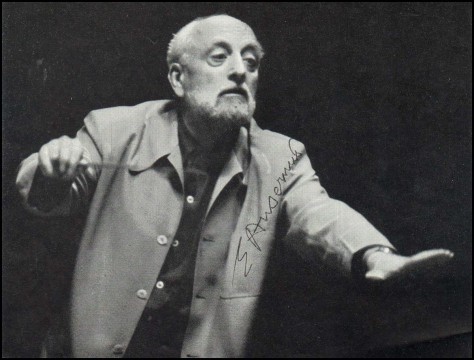
His Recitals Reviewed

In the course of two years, between January 1946 and December 1947, Lipatti played eight times in Brussels. His program of events listed two evenings with Orchestre National de Belgique under Ernest Ansermet, another four concerts (from which three for the young public, within the Jeunesses Musicales series) with the same orchestra led by Paul Sacher, and two recitals.
Praise not only followed, but also preceded Lipatti’s highly advertised appearances, as proves La Meuse from October 26 and 28, 1946:
“You will enjoy the exceptional gratification of being able to listen to this pianist about whom we have heard only the greatest things, to this virtuoso whom Cortot declared to be the new Horowitz”, or, “Without any doubt, those who will not come hear the remarkable Dinu Lipatti, this revelation of the piano, will regret it.”
The series of concerts in Brussels, between January and December 1947 were reviewed as follows.
La Libre Belgique, January 8, 1946:
“Dinu Lipatti, professor at the Virtuosity class in Geneva, amply demonstrated, by his interpretation of Chopin’s E minor piano concerto, his uttermost qualities: precision and clarity, graceful touch and purity of nuance, along with a complete mastering of the keyboard.”
A review of the same evening (featuring the E minor Chopin concerto), published in La Dernière Heure:
“Mr Dinu Lipatti, Romanian pianist of extraordinary talent, [gave] a performance [which] combined impeccable technique and refined sensitivity, leaving us wondering whether it was the charm of his talent which turned this work into such an attractive music, or whether it was the mediocrity of other pianists’ that made us ignore it for such a long time.”
Dinu Lipatti’s very next recital was just as acclaimed as his triumph with Orchestre National de Belgique.
On the January 11, 1946 La Lanterne wrote:
“Dinu Lipatti masters equally well the Classical, Romantic, or Modern style, putting his whole soul in each and every work, and playing each and every one with an inexhaustible expressiveness.”
Towards the end of 1946, Dinu Lipatti returned to Brussels.
La Cité Nouvelle remarked on November 6:
“This was an evening of high quality, impressing us deeply; it seemed the very soul of gentle [and] brilliant Mozart, whose works we heard, was there, inspiring the musicians an exceptional state of mind.”